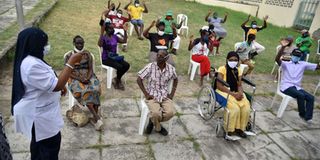Disability shouldn’t lock one out

Coast Association for Persons with Disability [CAPD] conducts training before donating special masks to persons living with hearing disabilities to enable them to read lips for proper translation during communication through sign language at Tudor area in Mombasa in this photo taken on 22nd May 2020.
What you need to know:
- Much too often, the belief in society is that persons with disabilities cannot work or can only work in the informal economy.
- Many persons with disabilities will opt for self-employment and find their income in the informal economy.
Persons with disabilities constitute a significant population in the world. Over the years, governments in different parts of the world have attempted to protect this disadvantaged group by providing various kinds of social and medical services.
According to the 2019 Kenya Population and Housing Census, the country has a disability prevalence rate of 2.2 per cent among Kenyans aged five years and above.
The Kenya National Survey on Persons with Disabilities (2007) shows most persons with disabilities are underemployed with only 16 per cent working for pay and 33 per cent in own or family business.
The same report shows that women with disabilities are even less likely to work for pay, at only 7.54 per cent, compared to men with disabilities at 17.7 per cent. It is, therefore, important to further examine the connection between gender and disability in the labour force.
Much too often, the belief in society is that persons with disabilities cannot work or can only work in the informal economy.
Many persons with disabilities will opt for self-employment and find their income in the informal economy.
However, key employment industry players should strive to promote the employment of persons with disabilities in the private sector.
Promoting the employment of persons with disabilities requires actions at many fronts and one can group them in three big areas: Promoting disability-inclusive employers, promoting access of persons with disabilities to the labour market skills; and creating an enabling environment that is conducive to the employment of persons with disabilities.
The Federation of Kenya Employers (FKE) takes cognisance of the fact that employment of need to be addressed in social dialogue institutions and processes.
There is a need to support employers to be more disability-inclusive and confident. And one key strategy to achieve this is the promotion of employer-led networks on business and disability.
FKE believes that the promotion of employability of persons with disabilities is a shared responsibility. In collaboration with the International Labour Organization (ILO) and other partners of Innovation to Inclusion (i2i) programme led by Leonard Cheshire, FKE is establishing the Kenya Business and Disability Network (KBDN), which will be a single voice for businesses in the country on disability vis-à-vis other stakeholders, including government and workers.
Learn from one another
KBDN will be launched at the Employers Annual Conference on November 19. This network will allow not only companies to learn from one another on disability inclusion but also the production — in collaboration with other stakeholders and, in particular, organisations of persons with disabilities — of resources that could support the employment of persons with disabilities in the private sector.
On the other hand, it is important to ensure that persons with disabilities have access to the labour market skills that the private sector demands.
If persons with disabilities do not have access to these skills, they might either not be able to find any work or will be forced to only work at a very basic level. That requires, for instance, that universities and vocational training institutions be inclusive of persons with disabilities.
The National Industrial Training Authority (Nita) and the Technical and Vocational Training Authority (TVETA) are focused on ensuring that curriculums are accessible to persons with disabilities while some universities like Kenyatta University have traditionally led in actively recruiting students with disabilities into the higher education system.
Finally, and equally important, the policy and legal environment needs to be supportive. For instance, social protection benefits should be provided to persons with disabilities to cover their extra costs and should be compatible with employment.
The Persons with Disabilities Act provides for a qualified employee with a disability to be subject to the same terms and conditions of employment and the same compensation, privileges, benefits, fringe benefits, incentives or allowances as the rest of the employees with similar qualifications.
It further recommends that an employee with a disability shall be entitled to exemption from tax on all income accruing from his employment.
Despite strides made by the Kenyan government in terms of enacting the Act, which aims at boosting participation of persons with disabilities in employment, there is still a big gap between the law and its implementation.
What is needed is goodwill in implementation of the existing law at all levels, as well as provision of resources to support this change.
Jaindi Kisero’s column has taken a break.





